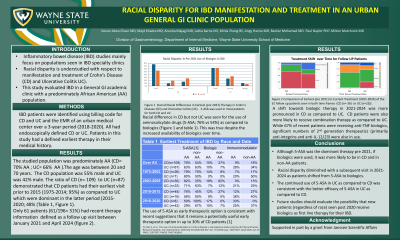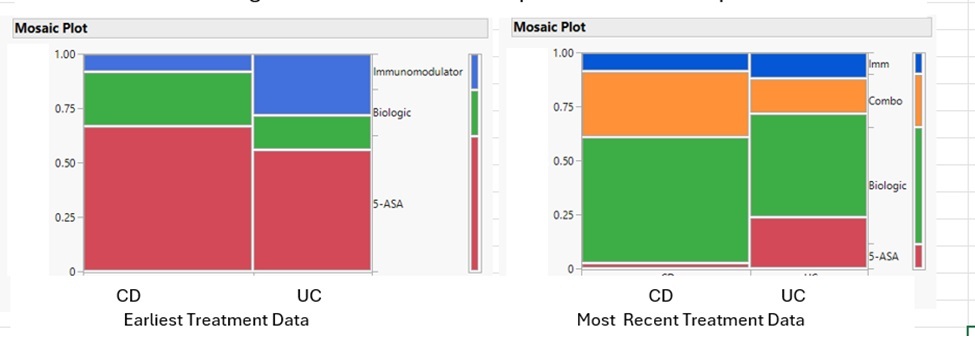Monday Poster Session
Category: IBD
P2664 - Racial Disparity for IBD Manifestation and Treatment in an Urban General GI Clinic Population
Monday, October 28, 2024
10:30 AM - 4:00 PM ET
Location: Exhibit Hall E

Has Audio

Kenan Abou Chaer, MD
Detroit Medical Center/Wayne State University
Detroit, MI
Presenting Author(s)
Kenan Abou Chaer, MD1, Majd Khadra, MD1, Anusha Majagi, MD1, Saumya L. Karne, DO1, Minie Zhang, BS2, Angy Hanna, MD1, Bashar Mohamad, MD3, Paul H. Naylor, PhD4, Milton G. Mutchnick, MD3
1Detroit Medical Center/Wayne State University, Detroit, MI; 2Wayne State University School of Medicine / Detroit Medical Center, Detroit, MI; 3Wayne State University, Detroit, MI; 4Wayne State University School of Medicine, Hazel Park, MI
Introduction: Inflammatory bowel disease (IBD) research has traditionally focused on general populations seen in IBD specialty clinics as compared to African American (AA) patients seen in real world general GI clinics. Thus, racial disparity is understudied with respect to treatment of the two diverse manifestations of the disease (Crohn’s Disease (CD) and Ulcerative Colitis (UC)).
Methods: Using the provider billing code for CD and UC over a 3-year period (2018-2020), 196 IBD patients seen in an urban medical center were identified. All had endoscopically defined CD (n= 109) or UC (n=87). Patients in this study had a defined earliest therapy in their medical history at a visit during this period although the start date of therapy could have been prior to the visit. Recent therapy was defined using only 61 patients with a follow up visit between January 2021 and April 2024.
Results: The studied population was predominately AA (CD= 70% AA ; UC= 66% AA). There was racial disparity in CD with respect to the use of aminosalicylate drugs (5-ASA; 76% vs 54% table 1) but not in UC. This reliance on 5-ASA as primary initial therapy in AA with CD became even more prominent despite the increased availability of biologics over time. (Table 1 post 2003 data). As shown in Figure 1, for the 61 patients with a recent follow up visit, there was a clear shift regardless of race towards biologic therapy which was more pronounced in CD as compared to UC. CD patients were also more likely to receive combination therapy with the addition of an immunomodulator as compared to UC. While 67% of recent patients were receiving anti-TNF biologics, significant numbers of 2nd generation therapeutics (primarily anti-integrins and anti-IL-12/23) were also in use.
Discussion: The racial disparity in pre 2021 treatment of patients with CD as compared to UC was striking and driven by an increased ratio of 5-ASA use to biologics in AA as compared to non-AA. Racial disparity diminished in the patients with a visit post 2020 as they were shifted from 5-ASA to biologics. The continued use of 5-ASA in UC as compared to CD was consistent with the better efficacy of 5-ASA in UC as compared to CD. Yet to be evaluated is the possibility that new patients seen post 2020 receive biologics as first line therapy for their IBD. Supported in part by Janssen Scientific Affairs.

Note: The table for this abstract can be viewed in the ePoster Gallery section of the ACG 2024 ePoster Site or in The American Journal of Gastroenterology's abstract supplement issue, both of which will be available starting October 27, 2024.
Disclosures:
Kenan Abou Chaer, MD1, Majd Khadra, MD1, Anusha Majagi, MD1, Saumya L. Karne, DO1, Minie Zhang, BS2, Angy Hanna, MD1, Bashar Mohamad, MD3, Paul H. Naylor, PhD4, Milton G. Mutchnick, MD3. P2664 - Racial Disparity for IBD Manifestation and Treatment in an Urban General GI Clinic Population, ACG 2024 Annual Scientific Meeting Abstracts. Philadelphia, PA: American College of Gastroenterology.
1Detroit Medical Center/Wayne State University, Detroit, MI; 2Wayne State University School of Medicine / Detroit Medical Center, Detroit, MI; 3Wayne State University, Detroit, MI; 4Wayne State University School of Medicine, Hazel Park, MI
Introduction: Inflammatory bowel disease (IBD) research has traditionally focused on general populations seen in IBD specialty clinics as compared to African American (AA) patients seen in real world general GI clinics. Thus, racial disparity is understudied with respect to treatment of the two diverse manifestations of the disease (Crohn’s Disease (CD) and Ulcerative Colitis (UC)).
Methods: Using the provider billing code for CD and UC over a 3-year period (2018-2020), 196 IBD patients seen in an urban medical center were identified. All had endoscopically defined CD (n= 109) or UC (n=87). Patients in this study had a defined earliest therapy in their medical history at a visit during this period although the start date of therapy could have been prior to the visit. Recent therapy was defined using only 61 patients with a follow up visit between January 2021 and April 2024.
Results: The studied population was predominately AA (CD= 70% AA ; UC= 66% AA). There was racial disparity in CD with respect to the use of aminosalicylate drugs (5-ASA; 76% vs 54% table 1) but not in UC. This reliance on 5-ASA as primary initial therapy in AA with CD became even more prominent despite the increased availability of biologics over time. (Table 1 post 2003 data). As shown in Figure 1, for the 61 patients with a recent follow up visit, there was a clear shift regardless of race towards biologic therapy which was more pronounced in CD as compared to UC. CD patients were also more likely to receive combination therapy with the addition of an immunomodulator as compared to UC. While 67% of recent patients were receiving anti-TNF biologics, significant numbers of 2nd generation therapeutics (primarily anti-integrins and anti-IL-12/23) were also in use.
Discussion: The racial disparity in pre 2021 treatment of patients with CD as compared to UC was striking and driven by an increased ratio of 5-ASA use to biologics in AA as compared to non-AA. Racial disparity diminished in the patients with a visit post 2020 as they were shifted from 5-ASA to biologics. The continued use of 5-ASA in UC as compared to CD was consistent with the better efficacy of 5-ASA in UC as compared to CD. Yet to be evaluated is the possibility that new patients seen post 2020 receive biologics as first line therapy for their IBD. Supported in part by Janssen Scientific Affairs.

Figure: Figure 1 Comparison of Earliest Treatment (pre 2021) to Current Treatment (2021-2024) for Patients with IBD and follow up visit in January 2021-April 2024. The width of the x axis width of the bars represents the relationship of patients in either the CD (n= 36) or UC (n=25) groups and the y axis is the
ratio (%) of patients receiving each of the therapies.
ratio (%) of patients receiving each of the therapies.
Note: The table for this abstract can be viewed in the ePoster Gallery section of the ACG 2024 ePoster Site or in The American Journal of Gastroenterology's abstract supplement issue, both of which will be available starting October 27, 2024.
Disclosures:
Kenan Abou Chaer indicated no relevant financial relationships.
Majd Khadra indicated no relevant financial relationships.
Anusha Majagi indicated no relevant financial relationships.
Saumya Karne indicated no relevant financial relationships.
Minie Zhang indicated no relevant financial relationships.
Angy Hanna indicated no relevant financial relationships.
Bashar Mohamad indicated no relevant financial relationships.
Paul Naylor: Janssen Biotech Inc – Grant/Research Support. Salix Pharmaceuticals – Grant/Research Support.
Milton Mutchnick: Janssen – Grant/Research Support. Madrigal – Speakers Bureau. Salix – Grant/Research Support.
Kenan Abou Chaer, MD1, Majd Khadra, MD1, Anusha Majagi, MD1, Saumya L. Karne, DO1, Minie Zhang, BS2, Angy Hanna, MD1, Bashar Mohamad, MD3, Paul H. Naylor, PhD4, Milton G. Mutchnick, MD3. P2664 - Racial Disparity for IBD Manifestation and Treatment in an Urban General GI Clinic Population, ACG 2024 Annual Scientific Meeting Abstracts. Philadelphia, PA: American College of Gastroenterology.
